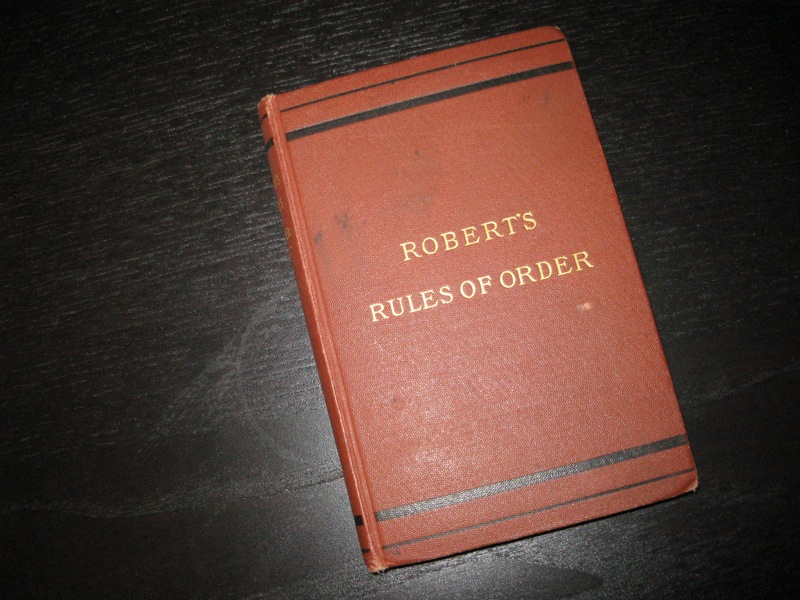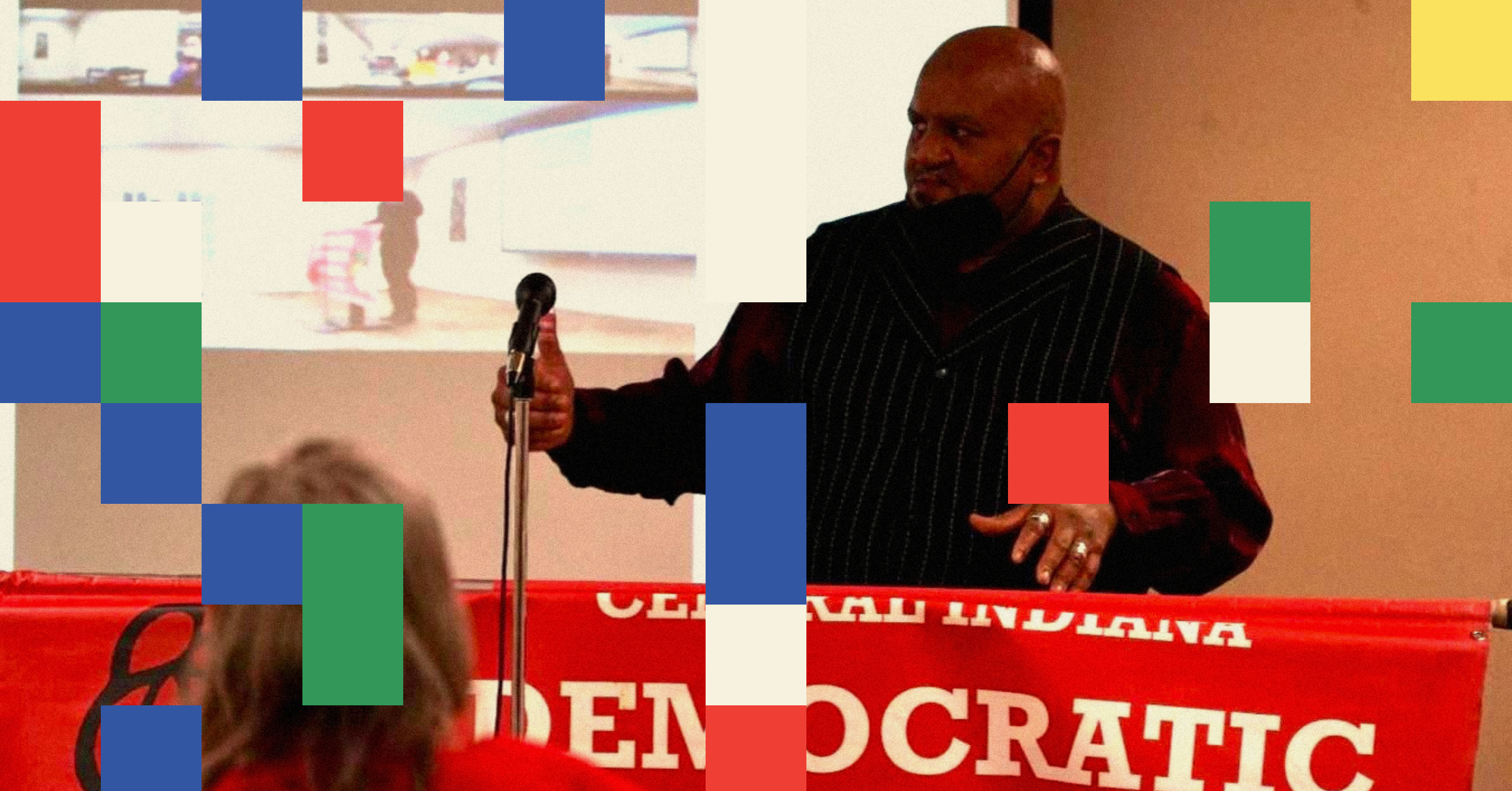In April, we published an article “Why Robert Should Rule” that made the case for using Robert’s Rules of Order in DSA meetings. In this article, Mike Parker offers an alternative perspective.
If you were at DSA’s August convention, you witnessed the amount of time wasted and the depressing effect of the continuous procedural wrangling. This happened despite excellent chairing, the employment of two professional parliamentarians as advisers, and training sessions on Robert’s Rules of Order held beforehand online and at regional conferences.
Delegates drew conclusions in two different directions. For some, the solution was still more training in Robert’s Rules; for others, the convention experience meant we needed to find better rules (the danger being more discussion about rules and less about politics).
Here, if the convention were not sufficient proof, I want to explain why the formal Robert’s Rules of Order are unworkable for a democratic body. Then I propose an approach to simplified rules that would fit the experience and needs of DSA members far better. I’ll give some links to simplified convention rules as models and suggest that instead of training in Robert’s Rules, we teach members how to run good meetings. Finally, I discuss the political implications of Robert’s Rules and why socialists should not champion them.
We Need Rules for Meetings
Almost all parliamentary rules have the same basic concepts: motions, amendments, chairs, points of procedure. When people refer to Robert’s Rules of Order, they usually just mean a generic set of rules that they use in their unions or other organizations. Even the official Robert’s Rules of Order comes in many flavors; there have been 11 editions since they were first published in 1876.
Many deliberative bodies use different rules. Congress and most state legislatures use Jefferson’s rules. The International Workers of the World use Rusty’s Rules. Most California cities use Rosenberg’s Rules. Most are just very stripped down and simplified versions of generic parliamentary procedure and cover most situations in meetings the same way.
Indeed, most organizations that claim to use Robert’s Rules actually use a simplified and modified generic form of parliamentary procedure. Sometimes it is modified by official bylaws but more often changes in procedure have evolved through practice.
There are good reasons for the simplifications. Robert’s Rules have at least five major shortcomings.
Too Complicated: The latest edition of Robert’s Rules of Order Newly Revised (RONR) contains over 700 pages. Books promising “Robert’s in Brief” are over 200 pages. The actual rules as written — not as actually used — are very complicated and difficult to understand, let alone put into practice.
Consider “Appeal from the Decision of the Chair.” It most often comes up at what is an already confusing time in a meeting where people are unsure and the chair, who anchors the meeting, is in doubt. Take a moment to click on the link. Few people could figure what to do with this from a fast read, let alone expect an entire assembly to have such a procedure internalized. And this is just one point.
Too Rigid: Different kinds of organizations and different situations require different rules. So most organizations must adapt the rules, formally or in practice.
The net result is that many people become “expert” at simplified and modified versions of meeting procedures through practice in their organizations. They may all call these “Robert’s Rules,” but when they meet each other at a convention or another organization, there is much disagreement on what the rules actually are.
Discourage Participation: It requires a lot of work to understand and be comfortable with the detailed rules. This is particularly off-putting to people with less formal education, to newly involved people, and to people who have better things to do with their time (all of us).
Easily Weaponized: The complexity of the rules often becomes a tool for people whose primary purpose is to derail or disrupt a meeting or to prevent a meeting from taking action.
Keep Us in the Weeds: Some have argued that using simplified rules instead may be well and good, but if you get in trouble and get into the weeds at least there is somewhere where the detailed problems have been worked out, and we can rely on this knowledge to get us out of the weeds.
Consider the experience at the convention. We hired professional parliamentarians to advise us. You may recall the one time the parliamentarian took the mic. From the floor, someone quoted Robert’s to say that a motion to “Suspend a Convention Standing Rule” required only a majority, not two-thirds. The parliamentarian agreed that this was what Robert’s Rules said, but then went on to say he had advised two-thirds — because in his view rules don’t make any sense unless they require two-thirds to suspend (an issue I will take up later).
In other words, he made up the rules as he went along according to his conception of democracy.
What got the convention out of confusing weeds several times was not Robert’s Rules but that the chairs were patient and skilled, sensed the will of the body, and were able to propose reasonable ways to accomplish what the body — the delegates — wanted to happen.
What to Do about Robert’s
As socialists our main purpose for having meetings is to organize to get things done. Secondly, we want to grow rapidly and that means our meetings have to be accessible to new people. Parliamentary rules are important both to facilitate business and to make it easy for new people to figure out how to participate. Formal Robert’s Rules (original and all revisions) fail on both these counts.
Dealing with Reality
We are then caught between a rock and a hard place. Formal Robert’s Rules is not helpful — and is often harmful. The complexity of formal Robert’s Rules undermines our most important purpose for having rules: so that every one knows how to participate in a meeting and has an equal chance for participation.
But the last thing we want in our chapters (or our unions) is to have more debate about procedures and finding the right ones. One “rule” should guide the way we operate: It is better to have just an adequate procedure than to spend the time and energy to find the perfect one. Most organizations have evolved a simplified set of rules (often calling them Robert’s Rules) which are quite adequate. In practice, there is little difference whether a “friendly amendment” is handled according to, say, Rusty’s Rules or Robert’s.
So instead of fighting over interpretations of the rules or changing the formal rules, we should argue for the chair and the body having the flexibility to do what seems reasonable for the immediate situation. For some pointers on this approach, a simplified Robert’s Rules, and hints on running a meeting, both for members dealing with bad chairs and for chairs trying to run a democratic meeting, see the Labor Notes book “Democracy Is Power,” written by Martha Gruelle and me.
There are two reasons, however, for some socialists and union activists to study Robert’s Rules. First is to be able to challenge the people who abuse a claimed knowledge of Robert’s Rules. Second is to challenge chairs in bureaucratic unions and other meetings. Just remember, however, that using formal Robert’s Rules has to be done with restraint. We should avoid challenging past practice. (A lot of unions “Call the question” to see if people want more debate but go to a vote only when “Move the Question” is made and passed. Does it make an important difference?)
The person who gets up at a meeting to show off their knowledge of Robert’s Rules when it is not absolutely required earns contempt, not respect.
Robert’s Rules and Local Meetings
Most often you don’t need to rewrite your local bylaws. Just adopt a simplified version of Robert’s — the stuff that everybody sort of knows (see, for example, the one in “Democracy Is Power”) — and use common sense rather than a parliamentarian to handle the more difficult situations. Make sure the simplified rules are available to all new members and at every meeting.
If you have to make changes to your bylaws, consider whether it is worth it to take on the two-thirds issue discussed later on. Again, it is better to work with adequate rules than to embroil a chapter in debates about process when it could be out canvassing for Bernie or walking a picket line to support a local strike.
Also, you might insert in your simplified rules: “The Chair may propose procedures to handle discussions, including considering more than one motion simultaneously.” In a political organization there may be, say, three distinctly different approaches to a question. It may be important to simultaneously refer all three to a committee. Or it may make sense to debate the three at the same time so they can easily be compared and contrasted, rotating speakers for each, instead of the maneuvers required under Robert’s Rules — substitute motions, or speaking against as a way to speak for something not yet presented.
If a meeting is small and is not factionalized, often the best procedure is “modified consensus.” This means discussing through an issue with the aim to find a position that the minority can live with. As in all versions of consensus, there is the danger that a minority can block what the majority wants to do and the danger of a majority intimidating a small minority. It is important to be clear that if consensus cannot be reached in a reasonable time, then the procedure shifts to normal voting.
Convention
If in most cases it is better to work with what people think are Robert’s Rules with some minor adjustments, conventions are the one case that serious thought must be given to how Robert’s Rules needs to be altered.
Conventions are quite different from most of the meetings we are used to. They are much bigger. People do not know each other as well and have minimum shared experience. The delegates do not carry over to the next meeting and many have no experience with conventions. Delegates bring their own understandings of common-sense Robert’s Rules. Conventions are billed as the most important meeting and the one opportunity to accomplish certain goals. Conventions have built-in deadlines (like what times meals are arranged in advance). It is more difficult to carry over unfinished business. And there is a huge time crunch — deliberation and action are desired on far too many issues to handle in the time available.
Almost every organization proposes special convention rules to handle these problems. Most make significant changes to Robert’s Rules even while claiming to be following Robert’s Rules, and most of these changes produce something very different from what people are used to in local meetings
Teamsters for a Democratic Union (TDU) has successfully used essentially the same simplified convention rules for more than 30 years. With just two pages of rules, everybody can know them and the convention can run smoothly.
The 2017 New York City DSA convention ran very well with these simplified rules.
Training on Good Meetings
We are building an organization of leaders. All our members should be able to organize meetings and chair them. It’s a learned skill — not something that is done well by following a recipe book. Instead of training sessions on Robert’s Rules of Order, we should train members on organizing, preparing, and running good meetings.
A good meeting is one that is well prepared; where members feel involved and are involved; where members feel their attendance and participation make a difference on something substantive. A good meeting is one where important decisions are made with the fullest possible discussion. Note that there is sometimes a tension between “making a decision” and “fullest possible discussion.” If the debate extends so that there is no decision on that item or on some other important items, then it is probably not democratic. Not making a decision is a decision.
If there is nothing important on the agenda, nothing can save meetings. But even worse are meetings where important decisions need to be made and the meeting does not deal with them. People stop coming to repeated bad meetings. If we want to change the world, who has this kind of time to waste?
Political Education About Robert’s: Should Robert’s Rule?
Any discussion about organization necessarily flows from political assumptions and has political implications. Rules of parliamentary procedure are no exception. Let’s take a look at the politics behind Robert’s Rules.
First, one of the supposed virtues of using Robert’s Rules compared to simpler rules is that Robert’s Rules goes into detail on all kinds of situations so that we have a final authority to settle a dispute if we get beyond the simple rules.
This is not much different from accepting the Pope as the final authority on what the Bible really means. In the case of Robert’s Rules, there are currently five men selected by the descendants of General Robert, who made the interpretations for the 11th edition of RONR.
This idea that how we proceed is to be determined by rules written down by some wise men is exactly what we are fighting against. We are for political and social revolution. That means new rules of society; that doesn’t mean that we have to change them all or all at once. But the only rule that is our bedrock is that the people must rule. All other rules are subordinate to that and can be changed if necessary.
Too often, meeting participants act as if they must “perform” Robert’s Rules correctly, as if Robert himself were looking down from above and judging. They spend lots of time debating what Robert’s Rules says rather than figuring out what is actually needed in the meeting.
What we want people to understand is that when they face a difficult situation, they have the ability, power, and obligation to figure out what to do, not to turn those decisions over to some form of scripture or committee of wise men. To solve a problem by claiming the authority of an obscure paragraph in a book is disempowering. Of course, we can consult experts and we can delegate decisions, but we have the ability to make the final decision.
Second, formal Robert’s Rules is inherently about subordination to authority figures. That’s what is behind the rule that all speakers must address the chairperson (even on substantive issues) rather than the delegates. It is natural for a delegate arguing a substantive question to turn to speak to the other delegates. Yet at the DSA convention, some speakers were told that this was a violation of Robert’s Rules and that they should face the chair when speaking. (This, as with some other bad rules, broke down as the convention proceeded.)
Finally, Robert’s Rules is touted as a good set of rules because it protects democracy, allowing majority rule while protecting minority rights by requiring two-thirds to stop debate or suspend the rules. First, that provision doesn’t protect minorities smaller than one-third. Second, in real life, these provisions are mainly used by a minority to keep the majority from carrying out its will. The two-thirds rule mostly works to protect the status quo for the minority. For years, the super-majority requirements protected the power of the Southern racists in Congress. Democracy requires that votes be decided by majority rule, not super-majority rule.
The two-thirds rule also teaches the wrong principle. Minority rights in a voluntary political organization cannot be protected by rules but by the consciousness of the majority of the value and importance of minority rights. In a healthy organization, you do not need a two-thirds rule to make sure that a minority has a chance to be heard. If the chair asks, “How many people feel the need for further debate?”, and a substantial minority raise their hands, it is unusual that the majority will then vote to cut off debate unless the situation is urgent. In an unhealthy voluntary organization where the majority does not respect the minority, one way or another, the organization will likely split no matter what the rules are.
If we acknowledge that there will be exceptional circumstances when the rules should be suspended, who is to decide that in a democratic organization, if not the majority? The minority?
All this said, promoting a critique of Robert’s should not be a priority in DSA. We have more important things to educate ourselves and others about, like class analysis, imperialism, and racism. It is usually better just to use a simplified Robert’s in the generic sense and let issues about the rules slide through as long as there is minimum harm.
We should, however, avoid promoting formal Robert’s Rules and celebrating them as an important skill. We want the simplest rules that fit the situation and to support the principle that the people — not Robert — should rule.




